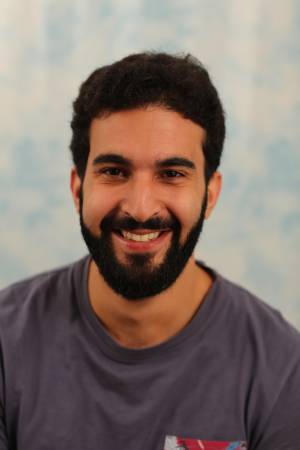Carnegie Mellon University
Understanding and Mitigating Biases in Evaluation
Abstract: There are many problems in real life that involve collecting and aggregating evaluation from people, such as hiring, peer grading and conference peer review. In this thesis, we focus on three sources of biases that arise in such problems, and propose methods to mitigate them. First, we study human bias, that is, the bias [...]
Carnegie Mellon University
MSR Thesis Talk: Manan Shah
ZOOM Link: https://www.google.com/url?q=https://cmu.zoom.us/j/93845075967?pwd%3DbndGc3NvaUVDVFFTTDZvektrNWJqdz09&sa=D&source=calendar&ust=1623592142330000&usg=AOvVaw1xfNPT5c59CQGKzR2bw5sO ID: 93845075967 Passcode: 159459 Title: 3D SLAM for Powered Lower Limb Prosthesis Abstract: During locomotion, humans use visual feedback to adjust their leg movement when navigating the environment. This natural behavior is lost, however, for lower-limb amputees, as current control strategies of prosthetic legs do not typically consider environment perception. With [...]
Carnegie Mellon University
MSR Thesis Talk: Dennis Melamed
Title: Learnable Spatio-Temporal Map Embeddings for Deep Inertial Localization Abstract: Pedestrian localization systems often fuse inertial odometry with map information via hand-defined methods to reduce odometry drift, but such methods are sensitive to noise and struggle to generalize across odometry sources. To address the robustness problem in map utilization, we propose a system that forms a [...]
Learning to Perceive Videos for Embodiment
Abstract: Video understanding has achieved tremendous success in computer vision tasks, such as action recognition, visual tracking, and visual representation learning. Recently, this success has gradually been converted into facilitating robots and embodied agents to interact with the environments. In this talk, I am going to introduce our recent efforts on extracting self-supervisory signals and [...]
Carnegie Mellon University
Self-Learning of Structured Visual Representations
Abstract: Most computer vision models in deployment today are not learning. Instead, they are in a "test" mode, where they will behave the same way perpetually, until they are replaced by newer models. This is a problem, because it means the models may perform poorly as soon as their "test" environment becomes different from their [...]
Carnegie Mellon University
Resource-Constrained Learning and Inference for Visual Perception
Abstract: Real-world applications usually require computer vision algorithms to meet certain resource constraints. In this talk, I will present evaluation methods and principled solutions for both training and testing. First, I will talk about a formal setting for studying training under the non-asymptotic, resource-constrained regime, i.e., budgeted training. We analyze the following problem: "given a [...]
Carnegie Mellon University
Towards Safe and Resilient Autonomy in Multi-Robot Systems
Abstract: Autonomous systems such as robotic systems are envisioned to co-exist with humans in our daily lives, from household service to large-scale warehouse logistics, agricultural monitoring, and smart city. Reliable interactions among robots and humans require provably correct guarantees about safety and performance when designing robot behaviors. While traditional approaches for safety and performance analysis [...]
Carnegie Mellon University
Provably Constant-Time Motion Planning
Abstract: In many robotic applications, including logistics and manufacturing, robots often operate in semi-structured environments and perform highly repetitive manipulation tasks. Additionally, large parts of these environments are static most of the time. Fast and reliable motion planning is one of the key elements that ensure efficient operations in such environments. A very common example [...]
MSR Thesis Talk: Kshitij Goel
Title: Rapid Subsurface Exploration with Multiple Aerial Robots Abstract: This thesis develops a robotic exploration framework that allows for rapid and communication-efficient mapping of unknown environments with a team of aerial robots. Aerial robots can provide rapid and agile mobility in diverse environments where ground mobility is either severely constrained or impossible. However, high-speed flight [...]
Carnegie Mellon University
MSR Thesis Talk: Albert Ye
Title: BusEdge: Efficient Live Video Analytics for Transit Buses via Edge Computing Abstract: Many vehicles like transit buses are now routinely fitted with cameras. These live visual data are invaluable to achieve real-time traffic monitoring, but it is intractable to handle such a gigantic amount of data either locally or in the cloud due to [...]
Carnegie Mellon University
Planning to Optimize and Learn Reward in Navigation Tasks in Structured Environments with Time Constraints
Abstract: Planning problems in which an agent must perform tasks for reward by navigating its environment while constrained by time and location have a wide variety of applications in robotics. Many real-world environments in which such planning problems apply, such as office buildings or city streets, are very structured. They consist of passages with notable [...]
Carnegie Mellon University
MSR Thesis Talk: Yunze Man
Title: Multi-Echo 3D Object Detection Abstract: LiDAR sensors can be used to obtain a wide range of measurement signals other than a simple 3D point cloud, and those signals can be leveraged to improve perception tasks like 3D object detection. A single laser pulse can be partially reflected by multiple objects along its path, resulting [...]
Carnegie Mellon University
Krishna Uppala – MSR Thesis Talk
Title: Exemplar free video retrieval. Abstract: Video retrieval of activities has a wide range of applications. In the traditional mode of operation, a collection of example videos describing the activities are given and the retrieval technique identifies other samples in a dataset that semantically match the examples provided. However, retrieval using a collection of example [...]
Ruixuan Liu – MSR Thesis Talk
Title: Data-efficient Behavior Prediction for Safe Human-Robot Collaboration. Abstract: Predicting human behavior is critical to facilitate safe and efficient human-robot collaboration (HRC). However, human behavior is difficult to predict due to the scarcity of human motion data. This work explores using online adaptation, an online approach, and data augmentation, an offline approach, to deal with the [...]
MSR Thesis Talk: Vidhi Jain
Title: Explainability in navigation policies Abstract: Today's autonomous agents have improved performance with learning and planning algorithms, but the applicability of such agents in the human-inhabited world is confined. Humans find it hard to explain the model's decision-making and thus, may not trust it as a teammate. While working with a machine learning model that [...]
Carnegie Mellon University
MSR Thesis Talk: Aditya Sripada
Title: Turning Behavior of Running Systems induced by Leg Placement Abstract: Compared to legged robots, animals and humans can perform much faster and larger turns, even when they run at high speeds. Such rapid turns require the body of a runner to reorient dynamically and in synchrony with its redirection during stance. While it is [...]
Carnegie Mellon University
MSR Thesis Talk: Rohit Jena
Title: Learning Mental Models of Experts in a Simulated Search and Rescue Scenario Abstract: Search and Rescue is a task where the rescuers need to be cognitively agile, strategically consistent, and efficient to save as many trapped victims as possible. In a team scenario, the rescuers must additionally coordinate with each other based on [...]
MSR Thesis Talk: Mohamad Qadri
Title: Robotic Vision for 3D Modeling and Sizing in Agriculture Abstract: Obtaining accurate perceptual information is a critical component in agricultural robotics since there is a heavy need for interaction with the environment to perform tasks such as pruning, harvesting, and phenotyping. In this thesis, we tackle the problem of perception and 3D modeling in [...]
Carnegie Mellon University
MSR Thesis Talk: Alex Baikovitz
Title: Underground Representations for Robot Localization and Mapping Abstract: There has been exciting recent progress in using radar as a sensor for robot navigation given its increased robustness to varying environmental conditions. However, within these different radar perception systems, ground penetrating radar (GPR) remains under-explored. By measuring structures beneath the ground, GPR can provide stable features that [...]
Carnegie Mellon University
MSR Thesis Talk: Ankur Deka
Title: On combining Reinforcement Learning & Adversarial Training Abstract: Reinforcement Learning (RL) allows us to train an agent to excel at a given sequential decision-making task by optimizing for a reward signal. Adversarial training involves a joint optimization scheme where an agent and an adversary compete against each other. In this work, we explore some [...]
MSR Thesis Talk: Zhengyi Luo
Title: Physics-based object-aware ego-centric human pose estimation Abstract: We investigate the roles of body kinematics, dynamics, and objects for 3D human pose estimation using a head-mounted camera. Human kinematics models play a key role in encoding the natural range of human motion, while dynamics models can react to the spatial arrangement between humans and objects [...]
MSR Thesis Talk: Tarasha Khurana
Title: Detecting Invisible People Abstract: Monocular object detection and tracking have improved drastically in recent years, but rely on a key assumption: that objects are visible to the camera. Many offline tracking approaches reason about occluded objects post-hoc, by linking together tracklets after the object re-appears, making use of reidentification (ReID). However, online tracking [...]
Carnegie Mellon University
MSR Thesis Talk: Sujay Bajracharya
work, we address the problem of goal-directed cloth manipulation, a challenging task due to the deformability of cloth. Our insight is that optical flow, a technique normally used for motion estimation in video, can also provide an effective representation for corresponding cloth poses across observation and goal images. We introduce FabricFlowNet (FFN), a cloth manipulation [...]
Carnegie Mellon University
MSR Thesis Talk: Edward Chen
Title: Towards Practical Ultrasound AI Across Real-World Patient Diversity Abstract: In the case of high-tempo, traumatic scenarios on the battlefield, real-time ultrasound (US) imaging serves as an enabler for countless possible robotic interventions. Having the ability to automatically segment anatomical landmarks in the body, such as arteries, veins, ligaments, and veins, for percutaneous procedures remains [...]
Carnegie Mellon University
MSR Thesis Talk: Haochen Wang
Title: Audiovisual ontology and robust representations via cross-modal fusion Abstract: The shrill of an ambulance siren and flashing lights, the hum of an accelerating car — important events often come to us simultaneously through sight and sound. We first consider the problem of identifying these events from raw, unlabeled audiovisual data of agents interacting with [...]
Social Navigation with Pedestrian Groups
Abstract: Autonomous navigation in human crowds (i.e., social navigation) presents several challenges: The robot often needs to rely on its noisy sensors to identify and localize the pedestrians in human crowds; The robot needs plan efficient paths to reach its goals; The robot needs to do so in a safe and socially appropriate manner. In [...]
Carnegie Mellon University
MSR Thesis Talk: Viraj Parimi
Title: T-HTN: Timeline Based HTN Planning for Multi-Agent Robots Abstract: Planning in mission-critical systems like deep-space habitats with onboard robotic systems must be robust to unforeseen circumstances. Such systems are expected to complete a set of goals with different deadlines each day for routine maintenance while also accounting for emergencies. With the presence of [...]
Carnegie Mellon University
Robust and Scalable Perception For Autonomy
Abstract: Autonomous mobile robots have the potential to drastically improve the quality of our daily life. For example, self-driving vehicles could make transportation safer and more affordable. To navigate complex environments, such robots need a perception system that translates raw sensory data to high-level understanding. This thesis focuses on two fundamental challenges in learning such [...]
Carnegie Mellon University
MSR Thesis Talk: Yiming Zuo
Title: Towards Self-supervised Object Discovery and Tracking Abstract: Object discovery and multiple object tracking (MOT) are two highly interrelated tasks that are known to be fundamental problems in computer vision, and are crucial for video understanding. Most existing methods rely on supervised training with human annotations, which is laborious and expensive. In this thesis, [...]
Carnegie Mellon University
MSR Thesis Talk: Qiao Gu
Title: Towards Object-generic 6D Pose Estimation Abstract: Pose estimation is a basic module in many robot manipulation pipelines. Estimating the pose of objects in the environment can be useful for grasping, motion planning, or manipulation. However, current state-of-the-art methods for pose estimation either rely on large annotated training sets or simulated data. Further, the long [...]
Carnegie Mellon University
MSR Thesis Talk: Divam Gupta
Title: End-to-End Deep Stereo Layout Estimation Abstract: Accurate layout estimation is crucial for planning and navigation in robotics applications, such as self-driving. In this paper, we introduce the Stereo Bird's Eye ViewNetwork (SBEVNet), a novel supervised end-to-end framework for estimation of bird's eye view layout from a pair of stereo images. Although our network [...]
Carnegie Mellon University
Michael Tasota – MSR Thesis Talk
Title: Design of a Multimodal System for Social Emotional Learning in Early Childhood Classrooms Abstract: As the prevalence of mobile and touch-based devices continues to expand in society, so too does its impact on young children. With educational technologies also on the rise, young children benefit most from those technologies that are designed to [...]
Carnegie Mellon University
MSR Thesis Talk: Aaron Huang
Title: End-to-End Methods for Autonomous Driving in Simulation Abstract: Fully autonomous driving is considered one of the grand challenges of modern technology and a variety of approaches have emerged for creating and evaluating autonomous driving agents. The self-driving industry typically adopts a modular software architecture and uses large fleets of autonomous vehicles for data [...]
Carnegie Mellon University
MSR Thesis Talk
Title: Retrieval-based Novel Activity Detection in Untrimmed Videos Abstract: Accurately detecting activities in untrimmed videos is a challenging task as systems need to handle variance in object scales, multiple viewpoints, and multiple types of activities. Furthermore, in a real-world scenario, activity detectors are often required to detect novel kinds of activities when the need [...]
Carnegie Mellon University
Semantic Mapping for Autonomous Navigation and Exploration
Abstract: The last two decades have seen enormous progress in the sensors and algorithms for 3D perception, giving robots the means to build accurate spatial maps and localize themselves in them in real time. The geometric information in these maps is invaluable for navigation while avoiding obstacles, but insufficient, by itself, for robots to robustly [...]
Carnegie Mellon University
MSR Thesis Talk: Howard Coffin
Title: Mutual Information Maps for Single and Multi-Target Ergodic Search Abstract: This thesis addresses use of multi-agent systems to perform autonomous search for moving targets. Target search has many applications, including search and rescue and surveillance, but most robotic systems used in these situations require human operators. Recent works have used ergodic search methods to [...]
Carnegie Mellon University
MSR Thesis Talk: Wanwen Chen
Title: Ultrasound-based Needle Tracking and Lateral Manipulation Planning for Common Needle Steering Abstract: Many medical interventions require inserting a needle towards the desired site. Robotic needle insertion can potentially provide reliable needle access independent of practitioner experience and availability. However, when the needle is inserted into heterogeneous tissue, the complicated needle-tissue interaction introduces multiple challenges [...]












